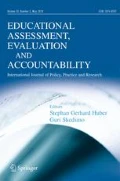Abstract
This article examines the politics of principal evaluation through both an extensive review of the literature and in-depth interviews with principals and superintendents. The findings reveal that the format and processes used in principal evaluation often vary from one district to another and that principals and superintendents frequently hold different perspectives about the purposes and usefulness of evaluation. Most principals felt their evaluations were not useful and were unduly influenced by political forces beyond their control. Superintendents believed that evaluations were well developed and useful in assessing principal competence. Principals should take an active role in the development and implementation of evaluation processes, while superintendents need to clearly communicate evaluation processes, purposes, and sources of information.
Similar content being viewed by others
References
Black, J.A., & English, F.W. (1986). What they don't tell you in schools of education about school administration. Lancaster, PA: Technomic.
Bolman, L.G., & Deal, T.E. (1997). Reframing organizations: Artistry, choice, and leadership (2nd ed.). San Francisco: Jossey-Bass.
Castetter, W.B. (1996). The human resource function in educational administration (6th ed.). Englewood Cliffs, NJ: Merrill.
Corbett, D.H. (1991). Community influence and school micropolitics. In J. Blase (Ed.), The politics of life in schools. Newbury Park, CA: Sage Publications.
Daft, R. (1995). Organizational theory and design. Minneapolis, MN: West.
Davis, S.H. (1998). Superintendents' perspectives on the involuntary departure of public school principals: The most frequent reasons why principals lose their jobs. Educational Administration Quarterly. 34(1), 58–90.
Davis, S.H. (1987). A study of the due process protections provided to demoted principals by California public school districts. Unpublished doctoral dissertation, Stanford University, Palo Alto, California.
U.S. Department of Education, National Center for Education Statistics. Digest of Education Statistics 1993. Retrieved (12/01/98) From the World Wide Web: http://nces01.ed.gov/pubsearch/pubsinfo.asp? pubid.93292.
Drake, T.L., & Roe, W.H. (1999). The principalship. (5th ed.). Upper Saddle River, NJ: Prentice-Hall.
Ellett, C.D. (1992). Principal evaluation and assessment. In M. C. Alkin (Ed.), Encyclopedia of educational research. 3, (pp. 1026–1031). New York: Macmillan.
Ginsberg, R., & Barnett, B. (1990). The folklore of principal evaluation. Journal of Personnel Evaluation in Education, 3, 205–230.
Glasman, N.S., & Heck, R.H. (1992). The changing leadership role of the principal: Implications for principal assessment. Peabody Journal of Education, 68(1), 5–24.
Greenberg, J., & Baron, R.A. (1997). Behavior in organizations (6th ed.). Upper Saddle River, NJ: Prentice Hall.
Hanson, M.E. (1996). Educational administration and organizational behavior (4th ed.). Boston: Allyn and Bacon.
Harris, M.M., & Schaubroeck, J. (1988). A meta-analysis of self-supervisor, self-peer, and peer-supervisor ratings. Personnel Psychology, 41(1), 43–62.
Kleine-Kracht, P., & Wong, K.K. (1991). When district authority intrudes upon the local school. In J. Blase (ed.), The politics of life in schools. Newbury Park, CA: Sage Publications.
Kowalski, T.J. (1999). The school superintendent: Theory, practice, and cases. Upper Saddle River, NJ: Merrill.
Lee, J., & Jablin, F.M. (1995). Maintenance communication in superior–subordinate work relationships. Human Communications Research, 22(2), 220–257.
Mitchell, D.E., Boyd, W.L., Cooper, B., Malen, B., & Marshall, C. (1994). Policy and political studies: Taxonomy and overview. New York: McGraw-Hill.
Murphy, J.A., & Pimental, S. (1996). Grading principals: Administrator evaluations come of age. Phi Delta Kappan, 78(1), 74–81.
Murphy, J., & Schiller, J. (1992). Transforming America's schools: Administrators' call to action. LaSalle, IL: Open Court.
Reeves, D.B. (1998). Holding principals accountable. The School Administrator, 55(9), 6–13.
Schrader, B.W., & Steiner, D.D. (1996). Common comparison standards: An approach to improving agreement between self and supervisory performance ratings. Journal of Applied Psychology, 81(6), 813–820.
Sergiovanni, T.J., Burlingame, M., Coombs, F.S., & Thurston, P.W. (1992). Educational governance and administration (3rd ed.). Boston: Allyn and Bacon.
Seyfarth, J.T. (1996). Personnel management for effective schools (2nd ed.). Boston: Allyn and Bacon.
Seyfarth, J.T. (1999). The principal: New leadership for new challenges. Upper Saddle River, NJ: Merrill.
Spring, J. (1998). Conflict of interests: The politics of American education. Boston: McGraw-Hill.
Stronge, J.H. (1991). The dynamics of effective performance evaluation systems in education: Conceptual, human relations, and technical domains. Journal of Personnel Evaluation in Education, 5, 77–83.
Ubben, G.C., & Hughes, L.W. (1997). The principal: Creative leadership for effective schools. Boston: Allyn & Bacon.
Wayne, S.J., & Liden, R.C. (1995) Effects of impression management on performance ratings: A longitudinal study. Academy of Management Journal, 38(1), 232–260.
Webb, L.D., & Norton, M.S. (1999). Human resources: Personnel issues and needs in education. (3rd ed.). Upper Saddle River, NJ: Merrill.
Wirt, F.M., & Kirst, M.W. (1997). The political dynamics of American education. Berkeley, CA: McCutchan.
Author information
Authors and Affiliations
Rights and permissions
About this article
Cite this article
Davis, S.H., Hensley, P.A. The Politics of Principal Evaluation. Journal of Personnel Evaluation in Education 13, 383–403 (1999). https://doi.org/10.1023/A:1008161417522
Issue Date:
DOI: https://doi.org/10.1023/A:1008161417522




